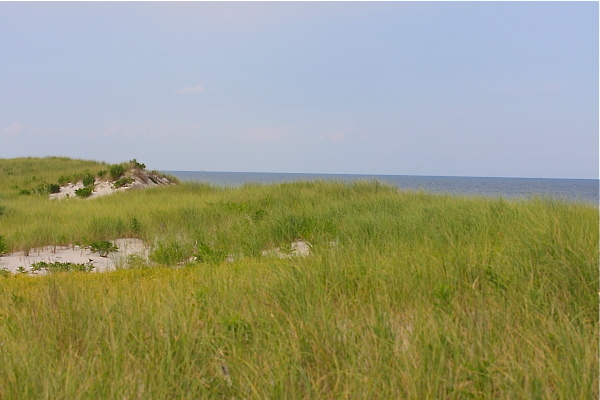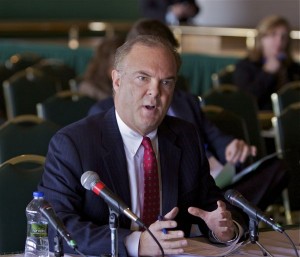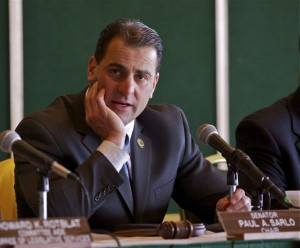“Bobby” Thinks He’s Doing a “Heck of a Job!”
- New Jersey was well prepared for Sandy, said Martin, the DEP chief. “While unfortunately some lives were lost, by and large we protected the state, we protected thousands of lives and lots of homes and lots of property overall and again we’ve done a great job with that and the Governor provided great leadership overall.” ~~~ WNYC Critics: Christie Deep-Sixed Climate Change Prep (12/7/12)
- It is beyond shortsighted and recklessly foolish to reduce coastal flood protections at a time when global warming science is telling us that there will be sea level rise and an increased frequency and intensity of coastal storms. ~~~ Bill Wolfe (8/20/10) “Alert: More Political Science Coming to DEP” written in response to Press Of Atlantic City story: Department of Environmental Protection to consider allowing decrease in Atlantic City dunes height
The issue of the role of dunes in protecting against storm surge has gotten a lot of media play recently, so I thought I’d remind folks of two important things: first, that natural dunes are not beach replenishment and second, not so long ago, DEP was favorably considering proposals to LOWER dune heights to enhance “visual access to the waterfront” (hit the links above for that story).
Of course, this and other DEP failures were all forgotten by last Monday, when DEP Commissioner Martin testified before the Senate Budget and Appropriations Committee on DEP’s role in Sandy preparation and emergency response.
I wrote a set up piece for that hearing, in hopes that Legislators or the press might ask some of the tough questions I posed and hold the Christie Administration accountable for major policy failures that contributed directly to the Sandy disaster (see: DEP to Face Legislative Oversight on Sandy Today) (and I didn’t even focus on the global warming rollbacks!)
I attended that Senate hearing and started to write a post about it, but, given the abysmal performance, just got too damned depressed to finish it (those with strong stomach’s can watch the hearing here).
So, let’s do the Cliff Notes version and just say that – aside from: 1) one good question by Senator Gordon on DEP’s failure to adopt updates to flood maps that are based on 40 year old data; 2) one good question from Senator Greenstein about whether Martin and the Gov. felt that the legislature had a role in developing policy on a rebuild strategy; and 3) clear warnings from Senator Beck about the risks from the rush to rebuild, particualrly in light of upcoming new FEMA flood elevations – the sparsely attended hearing was a total disaster.
Chairman Sarlo threw in the towel at the outset.
First, he warned his colleagues to consider the “real money” costs and impacts on the private sector. Second, in response to Senator Weinberg’s recommendations about mandating several emergency measures by legislation, he admonished them to respect government’s (limited) role.
But perhaps worst of all, Sarlo revealed that the legislature has become irrelevant – a political appendage of the Governor’s Office.
Sarlo surrendered and circumscribed the Legislature’s power by conceding that any Legislative package would consist only of “bills the Governor will sign”.
Getting back to the DEP testimony: Not only were no tough questions asked, but drooling Republican knuckleddraggers like Senators Oroho (R-ALEC) and Cardinale (R-Bergen) used it to bash “red tape” and to extract additional commitments by DEP Commissioner Martin to “relax” the Flood Hazard (stream encroachment) regulations.
Cardinale even called the streams of Bergen County merely “drainage ditches” that serve as a “stormwater drainage system” and then attacked the DEP professionals who seek to protect streams adn enforce flood hazard and water quality laws. Oroho agreed with Cardinale, and went on to take credit for crafting Martin’s Order on deregulation in response to Hurricane Irene.
Remarkably, DEP Commissioner Martin refused to defend environmental law or his Department or staff from this sham attack.
Instead, he nodded and grunted in assent to these attacks, expressed regret that he could only do certain rollbacks under his emergency powers, and then pledged to “relax” the flood hazard regulations soon.
Unfortunately, none of this or my questions got any media attention.
I could find only two news story on the hearing, both by NJ Spotlight – but they both gave Legislators, DEP, and Martin a pass (see this and this).
No one picked up on the significance of Martin’s testimony, which admitted widespread failures at drinking water and sewer plants.
DEP failed to prepare or enforce existing vulnerability and emergency planning requirements and then, to mask that failure, they essentially lied to the public because they did not disclose any of the sewage and water outages as they were occurring and would only confirm the Passaic and Middlesex sewage plant outages.
DEP issued several press releases at the time, all of which failed to mention the larger problem – how can the public believe anything they say?
I knew the problem was far more severe, and called DEP out at the time with this:
But, on a positive note, WNYC did a related story: Critics: Christie Deep-Sixed Climate Change Prep.
I expect that a subtle but supreme irony in that story will be lost on readers.
The story quotes Governor Christie recognizing Rutgers’ work on climate change:
“I know there are some folks at Rutgers who are looking at whether climate caused all this, but I certainly haven’t been briefed in the last year, year-and-a-half on this,” Christie told WNYC’s Bob Hennelly last month.
But, I guess the Gov. is not aware that Commissioner Martin abolished the DEP Offices of Climate Change and Policy and Planning. Now, the two DEP professionals who headed those Offices are at Rutgers working on the very climate change mitigation and adaptation planning work that DEP abandoned and has failed to implement:
Thrift is an issue Christie is comfortable talking about. Climate science isn’t. As Sandy was bearing down on the region , WNYC’s Bob Hennelly asked Christie if the Governor was discussing the increasing severity of storms with climate change scientists.
“No, that’s over my head.,” Christie replied.
That’s been Christie’s approach to questions about climate change. Once he said he was “skeptical.” When he was pressed about the increasing severity of storms, he maintained he’s a lawyer, not a scientist.
“But that’s what we have an academic community to do is to think about those bigger issues and if those experts have an answer for me, my door is always open to listen to them,” Christie said.
Several of the people who lost their jobs when the Office of Climate Change was cut now work in academia — at Rutgers University.
Yup, climate change is over the Governor and DEP Commissioner Martin’s head.
But, hey, they’re doing a hack of a job!



Bill:
The New York Times is reporting in this morning’s print edition (Sat. Dec. 8th, 2012, page A-16) that the President’s post Sandy emergency spending measures/ recommendations include “$4 billion for the Army Corps of Engineers, which will be in charge of various projects including beach replenishment.”
Did the NJ environmental gathering of a few weeks back ever issue a paper of recommendations?
Also noted in the same edition of the Times is a Letter to the Editor from Ryan Alexander, President of Taxpayers for Common Sense, who ridicules the Corps dune creation efforts: “…’it’s a win-win for the corps: if the town didn’t flood, the dune saved it; if it did flood, it would have worse without the dune. Here’s something to think about: If a storm slams a beach and there isn’t a house to destroy, is it still a natural disaster?'”
Thinking about all the changes that we were considering Sandy might have brought to public policy, it would appear that the balance of forces to keep the status-quo at the coast haven’t changed, global warming implications or not. And in fact, in may have led to a doubling done via its measures to protect the built coast “at all costs.” It’s fascinating to listen to Mayor Bloomberg’s stance now on rebuild, especially in light of his presidential election “intervention.” He comes across as a physical defender at all costs too.
Although I appreciate Taxpayers for Common Sense for allies, I haven’t followed them closely enough to know where they stand on all the broader issues of political economy; are they Austerians who don’t believe any economic tragedy, such as the Great Recession, and a very sluggish recovery, warrant additional federal spending pointing us back to “full employment.” I rather doubt they would be supporting a green Civilian Conservation Corps, whom it would seem would have plenty of work along the Mid-Atlantic coast, certainly for immediate clean-up; but then, what else: building a giant sea wall or hauling sand in wheel-barrows? And, by the way, the actual process of beach replenishment/sand dredging and initial dune creation is almost all mechanical, no big labor force involved. Beach grass planting may get a little more labor intensive.
I wonder if either the NJ or federal aid contains guidelines – the minimum policy level – for elevating the destroyed or damaged structures? That would be a rational and I suspect, embarrassing question to ask?
But who knows how this plays out in this Congress at this particular moment. The Times article states that vacation/second homes are not covered by the federal emergency aid.
And I’m going to close with this thought. The private sector of the economy – the neoliberal capitalism of the late 20th and early 21st century, made it a major point of ideology that “change and adaptibility” were going to be ever accelerating features of economic life – and by implication in my mind, therefore many other aspects of life. Blue collar workers bore the brunt of this, no where better conveyed in all its ruthlessness than GE CEO’s Jack Welsh’s wish to put all productive facilities on barges, to better shift them around and keep everyone – labor and state regulators – on notice as to who was running the show. I have written at some length about how Thomas Friedman’s writing also reinforced this theme of relentess change and the permanent flexibility demanded of the work force: you’ll be reskilling yourself to the day you’re laid in the grave – mostly at your own expense…by the way. An very interesting view of human nature, don’t you think, in a supposedly “conservative era?”
So what happens when nature is submitting a grand demonstration of climate changes on the horizon, and by direct logic, calling out for major changes in the economy and the way we live, no better spelled out than in Naomi Klein’s “Capitalism vs. the Climate.” The Republican Right, and the Democratic Center (the NJ delegation…?) and the business establishment lobbies in Washington, DC, have come down squarely and forcefully: we’re not changing a damn thing. And that applies to policies at the coast. In fact, we’re digging in and ready to build a new Atlantic Wall, whether of sand, steel gates or structures on stilts.